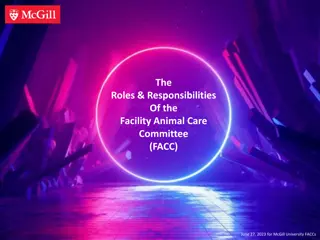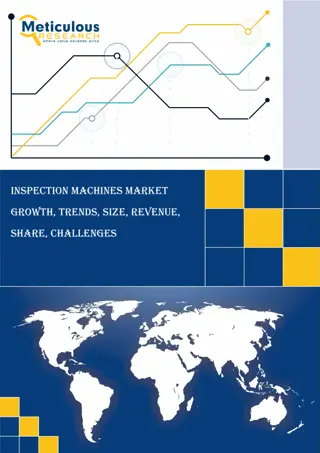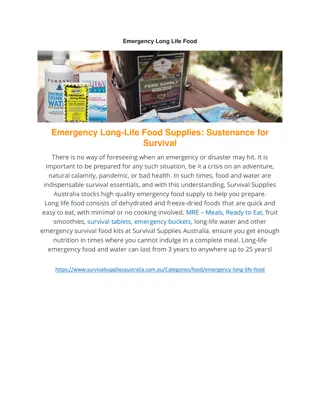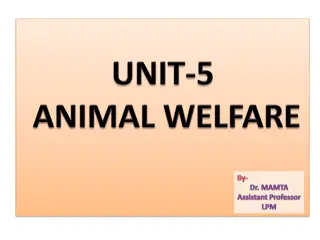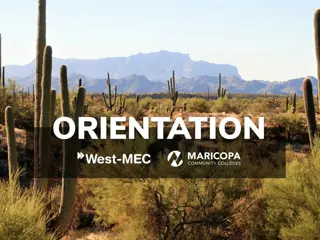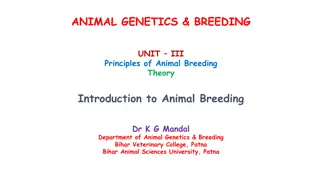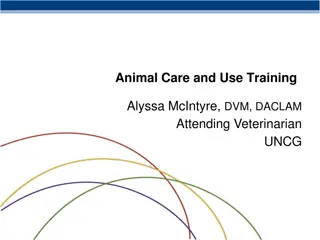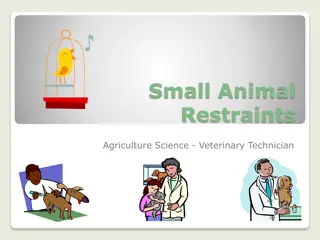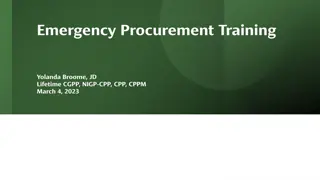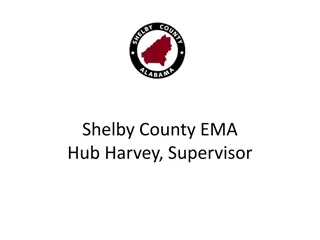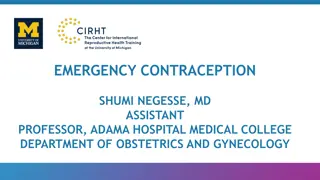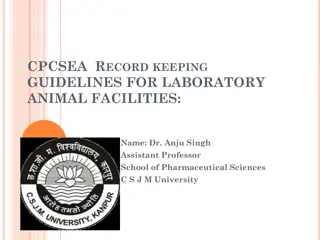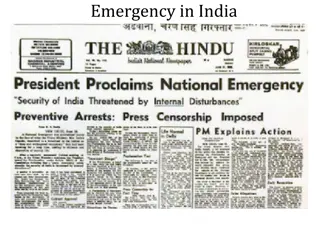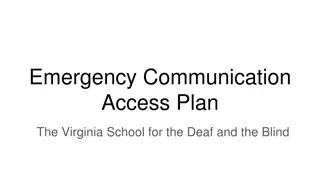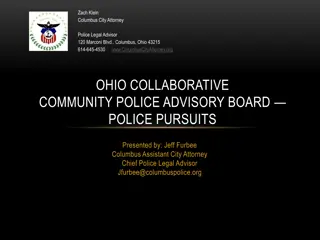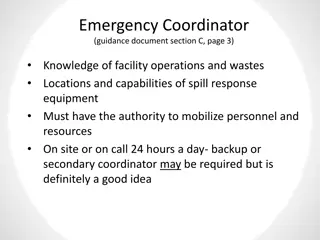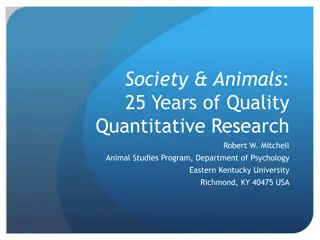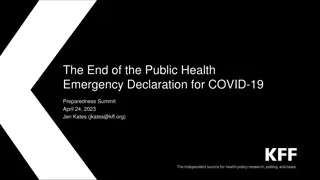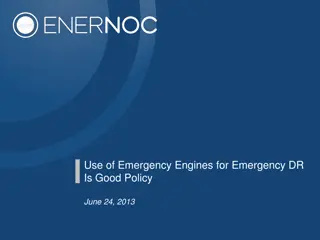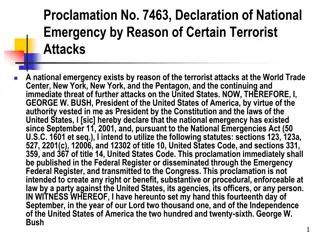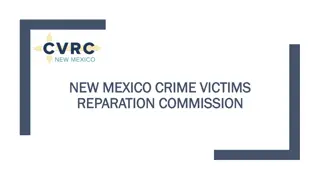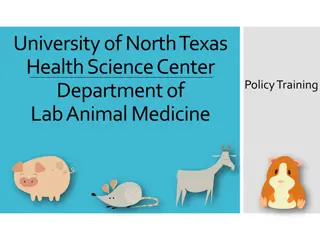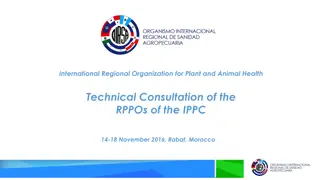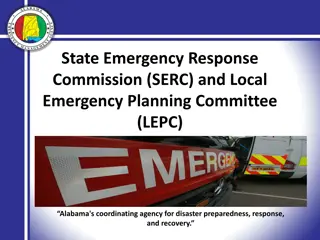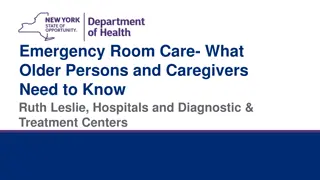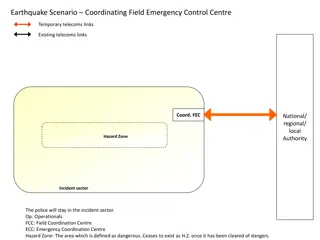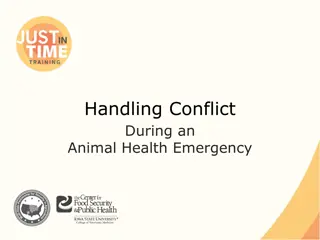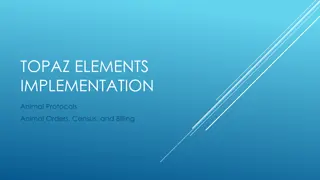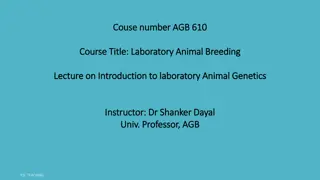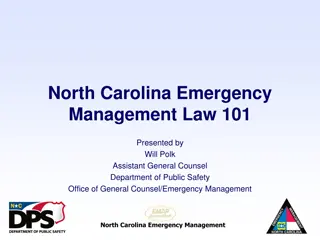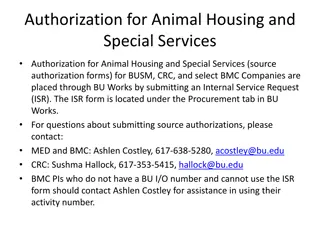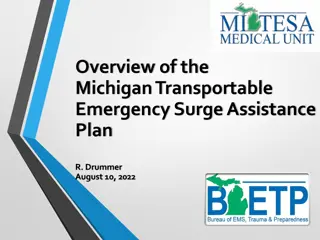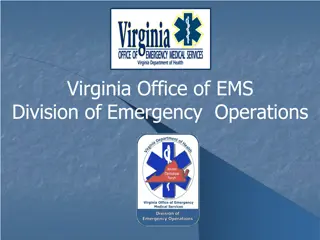History and Educational Programs of DEU Lab Animal Science Department
Established in 2004, the Department of Laboratory Animal Science at Dokuz Eylul University Institute of Health Sciences offers cutting-edge education focusing on animal welfare and ethical practices in scientific research. The department upholds the 3R Principle—Reduction, Refinement, Replacement�
0 views • 9 slides
Responsibilities of Facility Animal Care Committee at McGill University
The Facility Animal Care Committee (FACC) at McGill University oversees animal activities, ensures ethical treatment of animals, and adheres to guidelines from organizations such as the Canadian Council on Animal Care (CCAC). Responsibilities include continual oversight of animals, approving care pr
1 views • 13 slides
Emergency Response Proposed Rule - Worker Safety and Health Conference
The Emergency Response Proposed Rule aims to update regulations for worker safety and health, expanding coverage to include technical search and rescue and emergency medical service entities. The rule proposes replacing the existing Fire Brigades standard with an Emergency Response standard. Federal
2 views • 23 slides
Feed Software Market is expected to reach $456.1 million by 2030
The growth of this market is attributed to the adoption of digital technologies and automation in the animal feed industry, the growing animal population, increasing demand for healthy animal-based food products, increasing animal health expenditure and pet insurance, and the growing need to reduce
0 views • 4 slides
Emergency Long Life Food (Emergency Long-Life Food Supplies: Sustenance)
There is no way of foreseeing when an emergency or disaster may hit. It is important to be prepared for any such situation, be it a crisis on an adventure, natural calamity, pandemic, or bad health. In such times, food and water are indispensable survival essentials, and with this understanding, Sur
1 views • 1 slides
Animal Welfare and Ethics: Standards and Regulations in India
The content covers a wide range of topics related to animal welfare, ethics, and laws in India. It delves into the definition of animal welfare, the role of veterinarians, animal welfare organizations, regulations like the Prevention of Cruelty to Animals Act, and protection of wildlife, working ani
0 views • 15 slides
Emergency Medical Technician Program Details
This program offers a one-year Emergency Medical Technician (EMT) education with courses in College/Career Readiness, CPR/Basic Cardiac Life Support, Emergency Medical Responder, Basic Emergency Medical Technology, Applied Practical Studies, and Emergency Medical Technology Practicum. The schedule,
0 views • 33 slides
Principles of Animal Breeding: Introduction and Historical Perspective
This unit covers the introduction to animal breeding, the application of genetics principles in breeding, historical perspectives including the work of Robert Bakewell, and key events in animal breeding evolution. Topics include breeding systems, importance of animal breeding, and notable figures in
1 views • 12 slides
Importance of Training in Animal Care and Use for Research
Training in animal care and use is essential to ensure humane and appropriate treatment of research animals, promote regulatory compliance, and uphold high standards of science and animal well-being. The presentation covers the necessity of training, goals including reviewing animal use and identify
0 views • 53 slides
Small Animal Restraints and Safe Handling Practices in Veterinary Technology
Importance of safe practice when working with small animals includes preventing harm, reducing injury, and minimizing stress. Proper animal handling methods and tools are crucial for the safety of both animals and handlers. Common methods of handling different species, demonstrating appropriate anim
1 views • 22 slides
Understanding the Difference: Animal Rights vs. Animal Welfare
Explore the nuanced distinction between animal rights and animal welfare, delving into the ethical considerations, philosophies, and advocacy efforts surrounding these concepts. Discover how animal rights proponents emphasize the equal rights of animals, while animal welfare focuses on humane treatm
0 views • 36 slides
Emergency Procurement Procedures and Definitions for Public Safety
Understanding emergency procurement procedures is crucial in situations where immediate action is required to address threats to public health, welfare, or safety. This includes making emergency procurements for equipment, supplies, services, construction items, or professional/consultant services u
0 views • 12 slides
Emergency Planning and Response in Shelby County
Shelby County Emergency Management Agency (EMA) Hub, under the supervision of Supervisor Harvey, plays a crucial role in local emergency planning and response. The Local Emergency Planning Committee (LEPC) focuses on building strong relationships to ensure local success. Recent amendments to the Eme
0 views • 5 slides
Emergency Contraception Overview: Types, Usage, and Effectiveness
This presentation by Dr. Shumi Negesse provides an in-depth look at emergency contraception, including its definition, types of emergency contraceptives available, when to prescribe them, common side effects, and their effectiveness. The audience will learn about different emergency contraceptive pi
0 views • 23 slides
Laboratory Animal Facilities Record-keeping Guidelines
Guidelines for maintaining records in laboratory animal facilities include provisions for animal housing, staff records, health monitoring, and standard operating procedures. Compliance with CPCSEA regulations ensures ethical review procedures for animal research proposals. Focus is on providing a s
6 views • 11 slides
Emergency Provisions in the Indian Constitution: A Historical Overview
The emergency provisions in the Indian Constitution, including National/War Emergency under Article 352 and Constitutional Emergency in States under Article 356, have had significant historical implications. The period of Emergency declared from June 25, 1975, to March 21, 1977, during Indira Gandhi
0 views • 7 slides
Enhancing Emergency Communication Access Plan at Virginia School for the Deaf and the Blind
Virginia School for the Deaf and the Blind (VSDB) is taking steps to improve its emergency communication access plan to ensure all individuals on campus, including those who are deaf, hard of hearing, blind, or vision impaired, have full access to emergency alerts and instructions. The plan includes
2 views • 14 slides
Ohio Revised Code Sections on Emergency Vehicle Regulations
Explore the Ohio Revised Code sections pertaining to emergency vehicles, covering exemptions for emergency vehicle drivers in response to emergency calls, procedures for proceeding past red signals, and speed limit exceptions. These regulations ensure that emergency vehicles can navigate safely whil
0 views • 21 slides
Essential Emergency Coordinator Guidelines for Facilities
This guidance document outlines the key responsibilities and requirements for an emergency coordinator at a facility. It covers the knowledge needed for facility operations, spill response equipment, authority to mobilize resources, and protocols for handling fire, spills, and other incidents. Addit
0 views • 7 slides
Exploring Human-Animal Interactions through 25 Years of Quality Research
Delve into the interdisciplinary realm of human-animal interactions with a focus on social sciences and quantitative research. Discover key themes such as social psychology, therapy, animal welfare, and more. Explore attitudes and personality differences related to animal treatment, empathy, and bel
1 views • 26 slides
The End of Public Health Emergency: Legal Authorities and Legislative Actions
The public health emergency declaration for COVID-19 preparedness summit is coming to an end, with various legal authorities and legislative actions in place. The complex environment includes multiple emergency declarations, administrative actions, and legislation changes. Different declarations hav
0 views • 15 slides
Analysis of Emergency Engines and Ozone Levels in Demand Response Events
Use of emergency engines in demand response (DR) events does not correlate with high ozone levels, as shown by a study conducted from 2005 to 2011 across various regions like PJM, ISO NE, NYISO, and ERCOT. The analysis reveals that emergency DR events do not align with high ozone days, indicating no
0 views • 12 slides
Understanding National Emergency Declarations and Emergency Powers Laws
This content delves into the legal aspects of national emergency declarations, emergency powers laws, and judicial review of emergency declarations. It covers the purpose, termination, historical context, congressional oversight, and impact on presidential powers. It also explores the complexities o
0 views • 6 slides
Emergency Location Working Group Initiatives and Standards
The Emergency Location Working Group focuses on securely providing accurate location information for emergency calls in the UK. They address standards, publications, and current focus areas such as ETSI architecture review and protocols for locating VoIP emergency calls. The group collaborates with
0 views • 6 slides
Comprehensive Guide to Emergency Funds and Victim Support Services in New Mexico
The Crime Victims Reparation Commission (CVRC) in New Mexico provides assistance to victims of violent crimes, offering emergency funds and support services statewide. Learn about different types of emergency funds available, such as those for survivors of sexual violence and human trafficking crisi
0 views • 14 slides
A-29 Emergency Landing Gear Procedure
This emergency procedure outlines steps to follow in case of low pressure in the landing gear accumulator of the A-29 aircraft. It details actions to take for the emergency gear situation, including the response for low emergency brake accumulator pressure and the procedure to follow when the landin
0 views • 4 slides
Guidelines and Policies for Lab Animal Facility Access and Management
The Department of Lab Animal Medicine at the University of North Texas Health Science Center outlines important policies and procedures for accessing and managing the lab animal facility. From training requirements to access protocols, this comprehensive guide emphasizes safety, security, and compli
0 views • 30 slides
Importance of Calcium and Phosphorus in Animal Nutrition
Calcium and phosphorus are crucial minerals for animal health, with calcium being the most abundant mineral in the body. They play essential roles in nerve impulse transmission, muscle contraction, and bone structure. Deficiencies in these minerals can lead to conditions like rickets, osteomalacia,
0 views • 11 slides
Overview of International Regional Organization for Plant and Animal Health Technical Consultation
The International Regional Organization for Plant and Animal Health (OIRSA) is a legal entity with Member States in Central America and the Caribbean. Its objective is to assist Member States in developing animal and plant health plans and enhancing quarantine services and food safety. OIRSA's funct
0 views • 6 slides
Alabama State Emergency Response Commission (SERC) and Local Emergency Planning Committee (LEPC)
Alabama's State Emergency Response Commission (SERC) and Local Emergency Planning Committee (LEPC) are key agencies responsible for disaster preparedness, response, and recovery. The SERC, formed by Executive Order Number 4, appoints agencies like the Alabama Emergency Management Agency (AEMA) and A
0 views • 14 slides
Essential Guide to Emergency Room Care for Older Persons and Caregivers
Older persons and their caregivers need to be well-informed about emergency room care. This guide covers key aspects such as services provided in emergency departments, differences between emergency, inpatient, and outpatient care, observation billing, what to bring to the ED, and the CARE Act for c
0 views • 14 slides
Comprehensive Earthquake Emergency Response Scenarios
This detailed content outlines various earthquake emergency response scenarios including coordinating field control centers, temporary and existing telecoms links, national/regional/local authorities' roles, hazard zones, incident sectors, and specific tasks for different emergency teams such as sea
0 views • 9 slides
Handling Conflict During an Animal Health Emergency
When faced with conflict situations during an animal health emergency, understanding different backgrounds, values, and beliefs is crucial. Just-in-time training on conflict resolution can help deal with angry, fearful, or non-cooperative individuals. Before a site visit, learning about the owner, t
0 views • 14 slides
Upgrading to TOPAZ Elements: Enhancing Animal Protocols, Orders, Census, and Billing
The Animal Resource Facility (ARF) and Office of Animal Care Compliance (OACC) are shifting to TOPAZ Elements, a comprehensive web-based system, to streamline management of animal protocols, orders, census, and billing. This upgrade aims to provide better oversight for PIs, enhance compliance with r
0 views • 8 slides
Understanding Laboratory Animal Genetics and Research Importance
This course (AGB 610) delves into the realm of laboratory animal breeding, exploring the significance of using animals in research and teaching. Dr Shanker Dayal, a distinguished professor, guides students through lectures on animal genetics and the common uses of laboratory animals. The course emph
0 views • 14 slides
Understanding North Carolina Emergency Management Law 101
The North Carolina Emergency Management Law 101, presented by Will Polk, Assistant General Counsel, delves into the measures taken by governments and the populace at various levels to minimize the adverse effects of emergencies. The law covers the planning, prevention, mitigation, warning, movement,
0 views • 46 slides
Understanding Animal Tissue Culture and Cell Line Production
Animal tissue culture involves growing tissues separate from the animal in a laboratory setting. To achieve exponential cell growth, cells are converted into immortal cell lines. The production of a cell line involves steps like breaking cell adhesion, incubation, and transferring cells to fresh med
0 views • 22 slides
Authorization for Animal Housing and Special Services Process Guidelines
The guidelines outline the process for authorizing animal housing and special services at BUSM, CRC, and select BMC Companies through BU Works via Internal Service Requests (ISR). Investigators must submit ISR forms for animal housing at the Animal Science Center, monitor charges, and provide advanc
0 views • 8 slides
Michigan Transportable Emergency Surge Assistance Plan Overview
Michigan Transportable Emergency Surge Assistance (MI-TESA) Plan is a state resource established for emergency preparedness, featuring a mobile field hospital with various facilities and equipment stored strategically in Michigan. The primary healthcare mission of MI-TESA is to augment existing heal
0 views • 14 slides
Virginia Office of EMS Division of Emergency Operations
The Virginia Office of EMS Division of Emergency Operations is a crucial entity responsible for coordinating responses to various emergencies, including natural disasters, man-made incidents, and public health crises. Led by dedicated staff members, the division focuses on strategic initiatives to e
2 views • 21 slides

